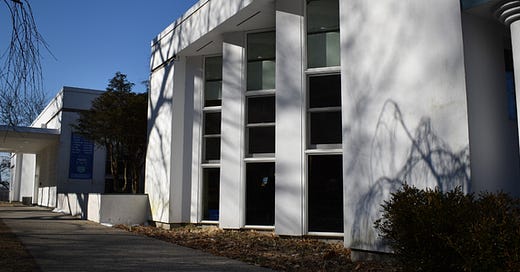Croton's library formally joins nationwide trend to end library fines. Marxist plot? No.
The library's Board of Trustees voted to end library fines in March, but the de facto policy had been in place since the beginning of the pandemic. It's going well.
Readers of the Croton Free Library’s Annual Newsletter, “Shelf Life,” may have noticed this message from library director Jesse Bourdon:
It’s official: the Croton Free Library no longer collects fines!
Back in March, our Board of Trustees voted unanimously to eliminate late fees on our materials.
Research has consistently shown that fines put up unnecessary barriers and deter some of the people who need library services, programs, and collections the most.
Our goal is to encourage people to use the Library — not turn them away — and we are proud to join the ranks of libraries all over the county, the state, and the country that have gone fine-free for overdue material.
While this is now the “official” policy, as Bourdon notes, in reality the library stopped collecting fines at the beginning of the pandemic. Unless you returned a book or other item late, you might not even have noticed.
The Board vote was taken at the March 11 meeting after Board president Susan Ranis called for a motion to make the unofficial policy official, and after Bourdon told the trustees that lost income from the policy was less than $2000 per year. (About half of the libraries in Westchester County have already adopted the fine-free policy.)
For anyone who thinks this is a radical step that encourages irresponsible behavior, in reality the no-fine movement has been underway for a number of years. By 2018, several big city library systems, including those of San Diego, Nashville, Salt Lake City, and Baltimore, had already eliminated overdue fines. The following year, the American Library Association formally endorsed this policy. The ball was rolling.
The primary rationale for eliminating fines was to stop the exodus of people without a lot of money from using the library, people who had either run up too many library fines to be able to use their cards or who were ashamed of returning books that were hopelessly overdue, or both. Students, as might be imagined, were among the biggest losers from punitive policies. The news media ran a number of such personal stories, and quoted library personnel to the effect that discouraging patrons from using the library was counter-intuitive and counter-productive.
The movement got a big boost when, in October 2021, the huge New York Public Library system announced, with lots of fanfare, that it too was eliminating fines. By the following April, the New York Times was able to headline a followup story on the new policy, “The Library Ends Late Fees, and the Treasures Roll In.”
But some disgruntled critics noted that the president of the NYPL is named Anthony Marx, and suggested that the inspiration for the fine-free movement came from his 19th century namesake. A typical view of this genre was published in The Federalist earlier this year, written by its executive editor, Joy Pullman. In a piece entitled “Our Library Stopped Late Fees, So I Stopped Returning Books,” Pullman commented:
“It’s another self-destruction tactic subtler and less morally abominable than using their dedicated taxpayer funds to purchase pornography for children.”
Pullman went on to accuse advocates of the policy of insulting people of modest means, rather than helping them:
“It’s also another instance of degrading public places in a bigoted assumption that poor people just can’t be expected to meet the standards other people can. It stoops to the level of the worst-behaved in our society instead of maintaining high expectations for all.”
But many media accounts quoted librarians to the effect that their job was not to teach moral fiber to the poor, but to make sure that everyone—rich and poor alike—had the easiest possible access to books and to reading. (It’s not hard to imagine that some book hoarders might well be more wealthy patrons terrified of being publicly humiliated if they were spotted at the circulation desk paying their library fines.)
Whatever the case, the word among Croton library staff is that the fine-free policy, in effect now for more than four years, is working well. Books are being returned, holds are being honored, and everyone is just reading merrily along. That’s good news, and not just for followers of Karl Marx.
*************************************************************************************************************
To share this post or to share The Croton Chronicle, please click on these links:
Comments policy: Please be polite and respectful.






Croton Free Library is not free. "free" here means the public is allowed in, yet it is not paid for by the public. It is funded by taxing property in the Croton-Harmon School District.
My family uses the Library obsessively, and our fines are way lower than our Library taxes. As a heavy user I would rather they increase borrowing costs and fines, and reduce my property taxes.
This latest change is particularly unfair to the 3% Croton-Harmon School District homeowners with homes in the Town of Yorktown. They pay for Yorktown John C. Hart Memorial Library in Shrub Oak and in addition they also pay for the Croton Free Library. They pay for two libraries. And both are inaccessible given Quaker Bridge is closed and Shrub Oak is many miles away. Imagine paying for two libraries and both being inaccessible.
The rest of Westchester has library districts that align with Village and Towns. Croton Free Library was funded through Croton Village. Then our stupid, stupid Board of Education Members did a deal to move Village costs to the School District, including the Library. We already have a separate School Library. So now, some people pay for 3 libraries and have effective access to none.
The Library Mission Statement still refers to Croton Village, forgetting that it is funded by the entire School District. The library is Village focused in its activities, with nothing for the South side of Croton River nor up beyond Mt Airy outside the Village. I object to the Library's exclusive focus on the Village residents.
Croton-Harmon has a democratic deficit, in that the Village residents outvote the rest of the School District, despite contributing far less in taxes each. This is why we get these horrible deals that move tax costs from Village residents to School District residents. The other example of this was the transfer of sports field costs from Village to School District. It is a democratic tyranny that Village residents are voting for School District taxes.
The only way this tyranny is allowed is because the Croton-Harmon Board of Education has been incredibly weak and ineffective for many, many years; and has agreed to all these stupid arrangements. Watch the annual School District budget meeting and see the Library taxes increase yet again. We desperately need smarter and more independently minded Board of Education members. We also need Library trustees that reflect the entire community, not just Village residents.
For Croton Free Library's Yorktown residents, they can request BOCES PNW to move them School Districts. They would get a reduction in property taxes, elimination of the second library tax, and a higher performing school district, which would give their property values a boost. Less tax, better schools, higher house prices - you can see the attraction.
There is a real danger of secession of the edges of Croton-Harmon School District to better performing and lower taxing adjacent districts. Given that it is State policy to align School Districts to municipal boundaries, this would go through if requested.
Excellent Seinfeld reference and episode!
Usually I would say this is another step to baby the newer generation of kids, but I guess the evidence shows that yearly losses are not that bad with the practice in place and people are generally responsible.